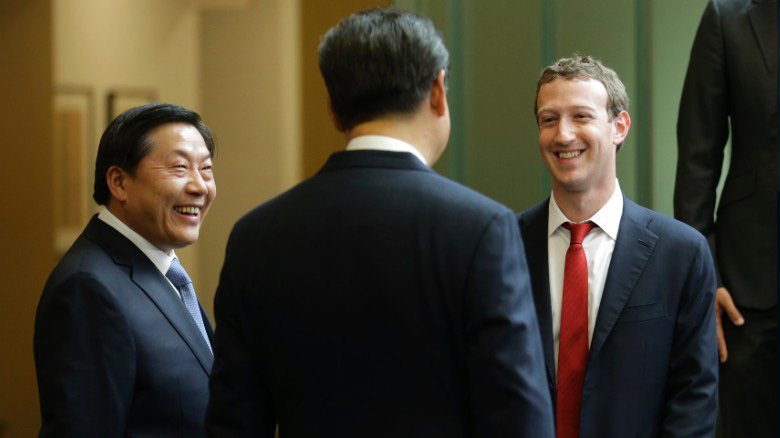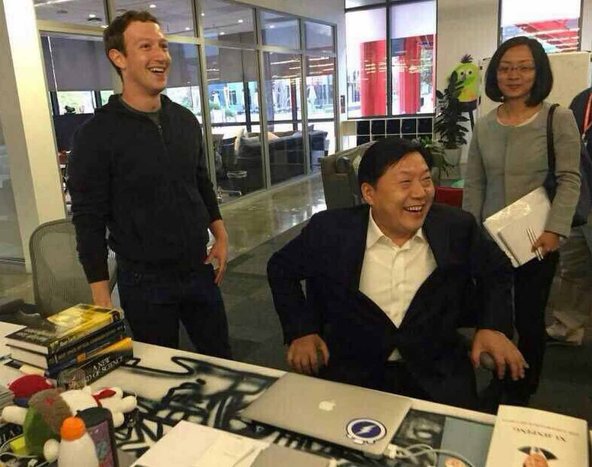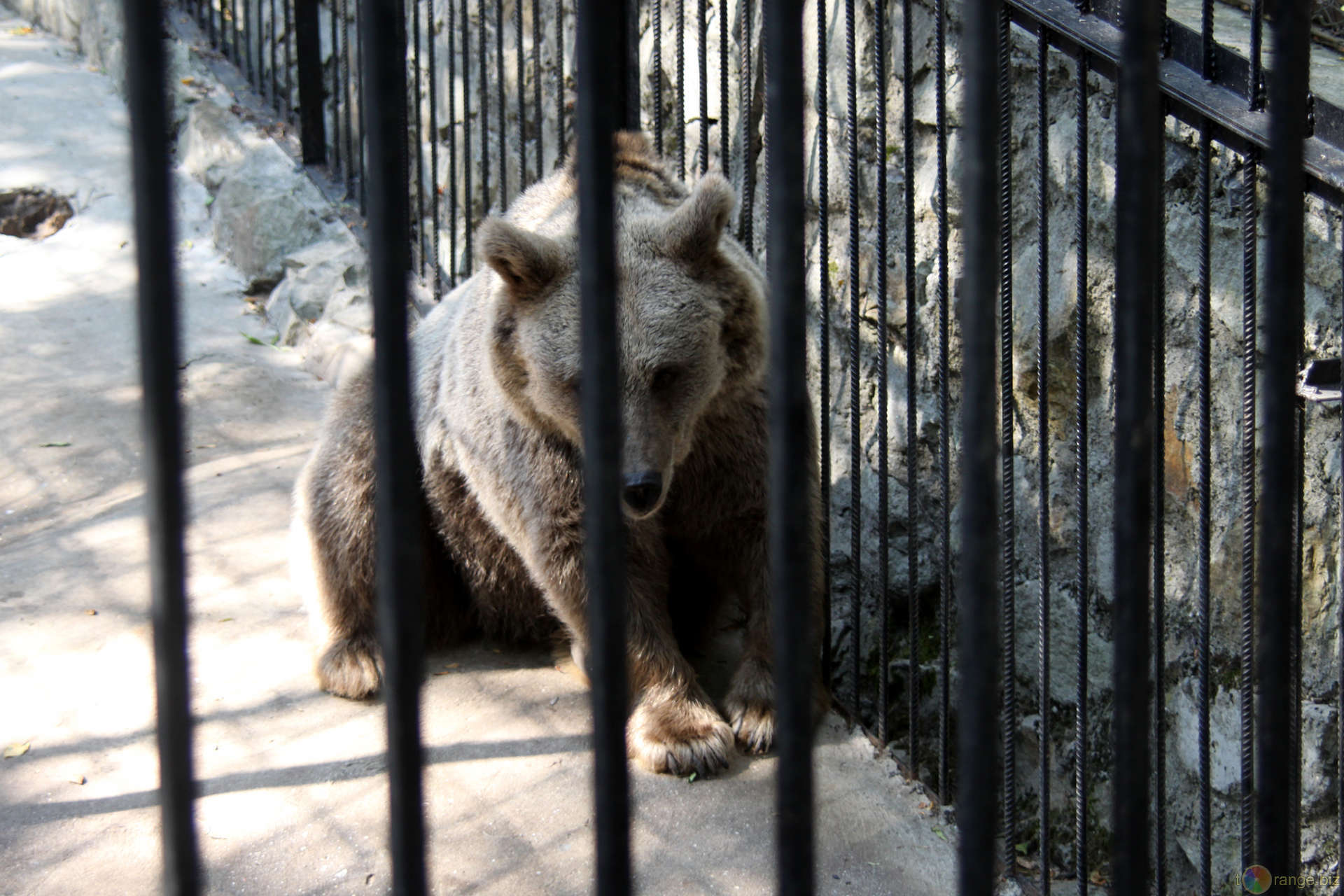The great Russian firewall is around the corner.
Friends, while you are sitting in your cozies, something important and terrible happens. We are going to share our experience with the main censor of China - Lu Wei .

The New York Times in a report on his visit to the Facebook office calls him none other than China's Web Czar . So this web king Lu Wei is the head of the Cyber Administration of the People's Republic of China, a member of the Politburo of the Central Committee of the Chinese Communist Party (the person is not public but rather high-ranking, above the ambassador). In fact, he is in China - the main firewall . Details about the "Golden Shield" 金工程 and the future of the Russian Internet under the cut.

Here's what Lu Wei usually says when they bump into him about censorship and the firewall:
“You say that some websites are blocked in China ... China is not able to block any foreign website located in another country. China cannot close your website in your country. We cannot change you, but we can choose our own friends. We can decide who can come to our home and who cannot. We do not welcome those who make money in China, and still leads campaigns to the detriment of China ... Nobody wants his enemy to visit him at his home. ”

And in general: “The use of the word„ censorship “is not entirely appropriate, it is regulation. China has 4 million Internet sites, about 700 million Internet users, 1 billion users of phones with Internet access and hundreds of millions of users of social networks, which produce 30 billion new messages every day. There is not a single country or organization that can censor all this information. We have achieved significant results aimed at combating chaos on the Internet. We are trying to strengthen the regulation of the Internet on the basis of the law. Our door will never close for Internet — companies that are not detrimental to the interests of Chinese consumers ... If you want freedom, you need order. Freedom is our goal, and order is our tool for achieving this goal. The more freedom you want, the more order you need. Without order, there can be no freedom. ”

')
So “freedom” and “order” are going to us.
“It seems appropriate to determine the limits of censoring the global Internet in Russia, since this problem is currently causing heated debates in the light of the intensification of advocates of the rights to freedom to receive and impart information. Interesting in this regard is the experience of foreign states opposing the United States and its allies. Due to unprecedented informational pressure, they went to the restrictions of foreign media in order to protect the national information space. For example, the Ministry of Industry and Informatization of China, from March 10, 2016, has imposed a ban on the operation of electronic media, wholly or partly owned by foreign residents. Such mass media will no longer be able to disseminate information through the Internet, and at best, through print media. Chinese media will cooperate with foreign online media only if they have permission from this ministry. In the leadership of the national media can work only citizens of China. Online media servers can only be located in China.
Enough to play false democracy, following pseudo-liberal values. It is time to put an effective barrier to this information war. Need a tough, adequate and symmetrical response. This is especially relevant in the conditions of the upcoming elections and the possible risks of intensifying the forces destabilizing the political situation ... ”
First of all, the Chinese mechanisms for blocking resources on the network are known as the “Great Chinese Firewall” or “Golden Shield” . There are several ways to block Internet resources that are used in the Golden Shield:
1) IP blocking - access to the host by its IP address is prohibited. If shared-hosting is deployed on the server, access will be blocked to all hosted sites.
2) DNS filtering and redirection - domain names are not resolved or incorrect IP addresses are returned.
3) URL filtering - blocking by URL or by keyword in the resource URL.
4) Packet filtering - intermittent transmission of TCP packets, based on the keywords found in the packet.
5) Connection reset - when re-accessing the resource blocked by the keyword, all subsequent attempts to connect to the resource will also be blocked for 30 seconds. Often suffer from this type of blocking and users who sit behind NAT together with the offender.
6) SSL man-in-the-middle attack - the classic MITM in SSL, we have heard how the Chinese do it more than once .
7) Active IP probing - active investigation of the network, non-public IP addresses for the presence of prohibited information. Found resources are blocked by 1 and 2 points.
8) VPN / SSH traffic recognition - define VPN and SSH traffic. They have already learned how to block VPN connections if the company has not received permission from the Ministry of Industry and Information of China.
As we see, only a small part of the blocking methods is now implemented in Russia. But we are gradually and progressively moving towards complete 金盾 工程 .
How did we get to this? Let's understand:
2011 - the Internet Safe League drafted amendments to 139- “On the protection of children from harmful information”
2012 - Entry into force of the amendments to the 139-FZ, the black list of Roskomnadzor
2013 - Ban of the Hentai
2014 - Mandatory identification of users of public Wi-Fi networks (Decree of the Government of the Russian Federation of July 31, 2014 No. 758).
2015 - The Internet Safety League signed a cooperation agreement with the Information Security Society of China, which involves holding a Russian-Chinese forum twice a year. Promotes the idea of "prefiltration."
2016 - Safe Internet Forum , Liu Wei confirmed his presence
2017 - ...?


The New York Times in a report on his visit to the Facebook office calls him none other than China's Web Czar . So this web king Lu Wei is the head of the Cyber Administration of the People's Republic of China, a member of the Politburo of the Central Committee of the Chinese Communist Party (the person is not public but rather high-ranking, above the ambassador). In fact, he is in China - the main firewall . Details about the "Golden Shield" 金工程 and the future of the Russian Internet under the cut.

Here's what Lu Wei usually says when they bump into him about censorship and the firewall:
“You say that some websites are blocked in China ... China is not able to block any foreign website located in another country. China cannot close your website in your country. We cannot change you, but we can choose our own friends. We can decide who can come to our home and who cannot. We do not welcome those who make money in China, and still leads campaigns to the detriment of China ... Nobody wants his enemy to visit him at his home. ”

And in general: “The use of the word„ censorship “is not entirely appropriate, it is regulation. China has 4 million Internet sites, about 700 million Internet users, 1 billion users of phones with Internet access and hundreds of millions of users of social networks, which produce 30 billion new messages every day. There is not a single country or organization that can censor all this information. We have achieved significant results aimed at combating chaos on the Internet. We are trying to strengthen the regulation of the Internet on the basis of the law. Our door will never close for Internet — companies that are not detrimental to the interests of Chinese consumers ... If you want freedom, you need order. Freedom is our goal, and order is our tool for achieving this goal. The more freedom you want, the more order you need. Without order, there can be no freedom. ”

')
So “freedom” and “order” are going to us.
- What kind of experience they want to pass on to us?
- Why did the main Chinese manufacturer of foil hats, closed, rarely go somewhere else, suddenly decided to personally visit Russia ?!
- Is it a coincidence right before this momentous event, Mr. Head of the Investigative Committee Bastrykin suddenly said:
“It seems appropriate to determine the limits of censoring the global Internet in Russia, since this problem is currently causing heated debates in the light of the intensification of advocates of the rights to freedom to receive and impart information. Interesting in this regard is the experience of foreign states opposing the United States and its allies. Due to unprecedented informational pressure, they went to the restrictions of foreign media in order to protect the national information space. For example, the Ministry of Industry and Informatization of China, from March 10, 2016, has imposed a ban on the operation of electronic media, wholly or partly owned by foreign residents. Such mass media will no longer be able to disseminate information through the Internet, and at best, through print media. Chinese media will cooperate with foreign online media only if they have permission from this ministry. In the leadership of the national media can work only citizens of China. Online media servers can only be located in China.
Enough to play false democracy, following pseudo-liberal values. It is time to put an effective barrier to this information war. Need a tough, adequate and symmetrical response. This is especially relevant in the conditions of the upcoming elections and the possible risks of intensifying the forces destabilizing the political situation ... ”
First of all, the Chinese mechanisms for blocking resources on the network are known as the “Great Chinese Firewall” or “Golden Shield” . There are several ways to block Internet resources that are used in the Golden Shield:
1) IP blocking - access to the host by its IP address is prohibited. If shared-hosting is deployed on the server, access will be blocked to all hosted sites.
2) DNS filtering and redirection - domain names are not resolved or incorrect IP addresses are returned.
3) URL filtering - blocking by URL or by keyword in the resource URL.
4) Packet filtering - intermittent transmission of TCP packets, based on the keywords found in the packet.
5) Connection reset - when re-accessing the resource blocked by the keyword, all subsequent attempts to connect to the resource will also be blocked for 30 seconds. Often suffer from this type of blocking and users who sit behind NAT together with the offender.
6) SSL man-in-the-middle attack - the classic MITM in SSL, we have heard how the Chinese do it more than once .
7) Active IP probing - active investigation of the network, non-public IP addresses for the presence of prohibited information. Found resources are blocked by 1 and 2 points.
8) VPN / SSH traffic recognition - define VPN and SSH traffic. They have already learned how to block VPN connections if the company has not received permission from the Ministry of Industry and Information of China.
As we see, only a small part of the blocking methods is now implemented in Russia. But we are gradually and progressively moving towards complete 金盾 工程 .
How did we get to this? Let's understand:
2011 - the Internet Safe League drafted amendments to 139- “On the protection of children from harmful information”
2012 - Entry into force of the amendments to the 139-FZ, the black list of Roskomnadzor
2013 - Ban of the Hentai
2014 - Mandatory identification of users of public Wi-Fi networks (Decree of the Government of the Russian Federation of July 31, 2014 No. 758).
2015 - The Internet Safety League signed a cooperation agreement with the Information Security Society of China, which involves holding a Russian-Chinese forum twice a year. Promotes the idea of "prefiltration."
2016 - Safe Internet Forum , Liu Wei confirmed his presence
2017 - ...?

Source: https://habr.com/ru/post/281969/
All Articles